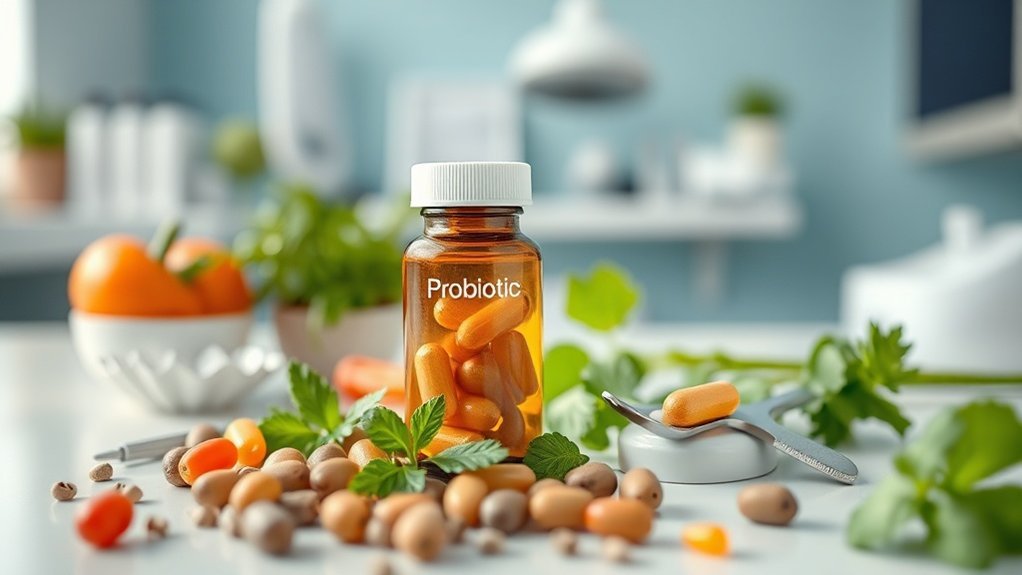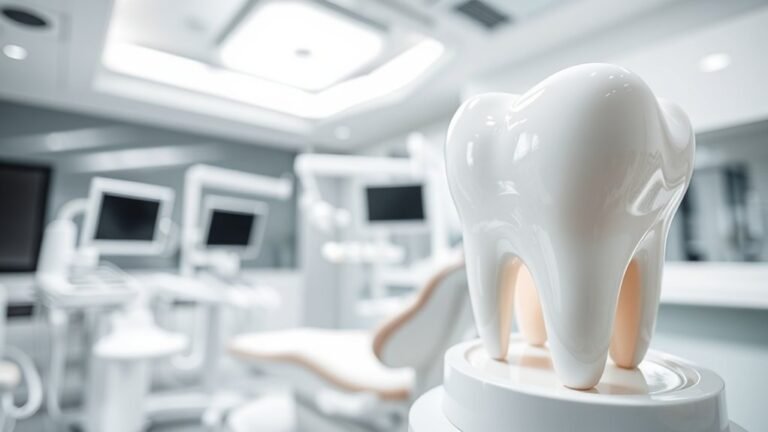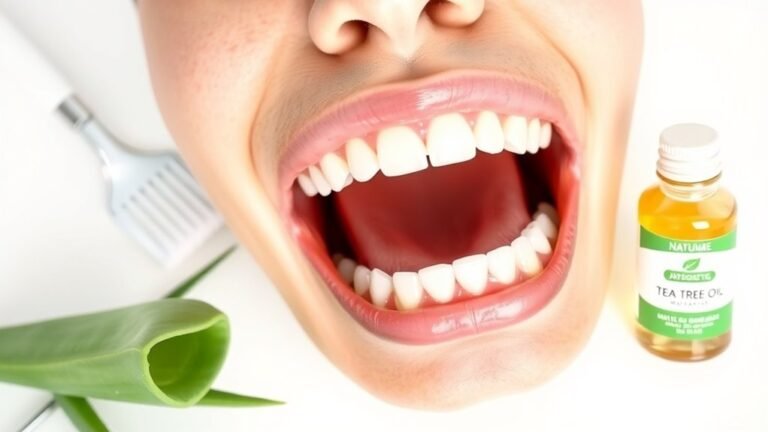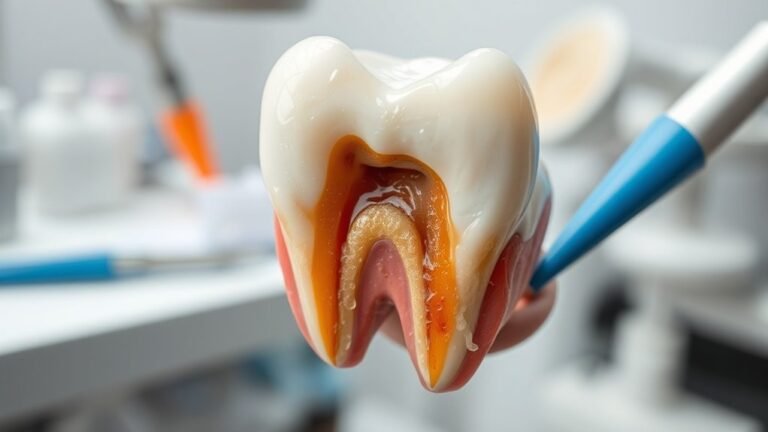Can Oral Probiotics Replace Traditional Treatments for Recurrent Oral Infections
Oral probiotics can’t fully replace traditional treatments for recurrent oral infections, but they can effectively complement them. These beneficial bacteria help restore balance in your oral microbiome and inhibit harmful pathogens. Probiotics offer a more sustainable option with fewer side effects compared to traditional antibiotics, promoting long-term oral health benefits. However, individual responses can vary, making personalized assessment important. Explore how oral probiotics can support your overall oral wellness and their role in future treatment strategies.
Key Takeaways
- Oral probiotics can restore microbial balance in the mouth, potentially reducing the frequency of recurrent oral infections.
- They offer a complementary approach to traditional treatments, enhancing oral health without the side effects associated with antibiotics.
- Probiotics promote a healthy oral microbiome, which can inhibit harmful pathogens and support immune function against infections.
- However, they may not be effective for all conditions, and personalized assessments are necessary for optimal use.
- Ongoing research will clarify probiotics’ role and effectiveness compared to traditional treatments for recurrent oral infections.
Understanding Oral Probiotics and Their Mechanism of Action
While you might be familiar with probiotics in general, understanding oral probiotics specifically reveals their unique role in managing recurrent oral infections. Oral probiotics contain beneficial bacteria that help restore microbial balance in the oral cavity. By introducing these live microorganisms, you can inhibit the growth of harmful pathogens. They produce substances known as bacteriocins, which are antimicrobial peptides that further protect against infection by targeting and neutralizing harmful bacteria. This mechanism enhances your oral health by promoting a balanced microbiome, reducing the incidence of infections like dental caries and periodontal disease. Incorporating oral probiotics into your routine could serve as a complementary strategy alongside traditional treatments, potentially improving overall oral health outcomes.
The Role of the Oral Microbiome in Health and Disease
The oral microbiome, consisting of trillions of microorganisms, plays an essential role in maintaining oral health and preventing disease. A balanced microbiome helps establish biofilm competition, where beneficial bacteria outnumber harmful pathogens. This competition is vital in reducing the risk of recurrent oral infections, as an imbalance can lead to dysbiosis, allowing opportunistic bacteria to thrive. Factors such as diet, hygiene, and antibiotic use can disrupt this balance, resulting in conditions like tooth decay and gum disease. By understanding the oral microbiome’s role, you can take proactive steps to support your oral health, potentially reducing the frequency of recurrent infections. Maintaining a diverse and balanced microbiome is key to preventing disease and promoting overall oral wellness.
Comparing Efficacy: Oral Probiotics vs. Traditional Treatments
As you explore solutions for recurrent oral infections, it is vital to compare the efficacy of oral probiotics with traditional treatments. While antibiotics are often the go-to solution, they can lead to resistance and disrupt your oral microbiome. Oral probiotics, as an antibiotic alternative, may offer a more sustainable approach.
Consider these key points:
- Mechanism of Action: Probiotics restore balance in the oral microbiome, potentially preventing infections.
- Side Effects: Traditional antibiotics can cause adverse effects, whereas probiotics generally have fewer risks.
- Long-Term Benefits: Probiotics may provide lasting protection against recurrent infections by promoting a healthy microbial environment.
Benefits of Incorporating Oral Probiotics Into Oral Care
Incorporating oral probiotics into your daily oral care regimen can greatly enhance your overall oral health. These beneficial bacteria help restore the natural balance of microorganisms in your mouth, potentially reducing the prevalence of harmful pathogens responsible for recurrent infections. By promoting a healthy oral microbiome, probiotics can support your immune system, making it more effective in fighting off infections. Additionally, they may aid in reducing inflammation and improving gum health, which is vital for preventing periodontal disease. Regular use of oral probiotics can also improve breath freshness, enhancing your confidence in social situations. Ultimately, integrating these probiotics into your routine offers a holistic approach to maintaining peak oral health while complementing traditional treatment methods.
Potential Limitations and Risks of Oral Probiotics
While oral probiotics offer several benefits, it’s important to evaluate potential limitations and risks associated with their use. You should be aware that not all probiotics are created equal, and some may not be effective for your specific condition. Consider the following potential risks:
It’s crucial to recognize that not all probiotics are effective for every condition; consult a healthcare professional before use.
- Inconsistent Strain Effectiveness: Different strains may yield varying results, making it difficult to predict outcomes.
- Possible Side Effects: Some users experience gastrointestinal discomfort, bloating, or allergic reactions.
- Interactions with Medications: Probiotics can interact with other treatments, potentially diminishing their effectiveness.
It’s essential to consult with a healthcare professional before starting any probiotic regimen to guarantee it’s appropriate for your individual needs and circumstances.
Case Studies: Success Stories of Oral Probiotic Use
Despite the potential limitations and risks associated with oral probiotics, many individuals have found success in managing recurrent oral infections through their use. Case studies reveal significant improvements in symptoms and overall oral health, showcasing the positive impact of probiotics.
| Patient Case | Outcome |
|---|---|
| Case 1: 35-year-old female with recurrent thrush | 80% reduction in episodes after 3 months of probiotics |
| Case 2: 42-year-old male with periodontal disease | Noticeable gum health improvement and reduced inflammation |
| Case 3: 28-year-old female with canker sores | Complete resolution of sores after 6 weeks |
| Case 4: 50-year-old male with chronic bad breath | Significant reduction in halitosis after 2 months |
| Case 5: 30-year-old female with dry mouth | Enhanced saliva production and comfort reported |
These cases illustrate the potential of oral probiotics as a supplementary treatment.
Future Directions in Oral Health Research and Treatment Options
As you consider the future of oral health, advancements in probiotic research promise to reshape treatment options considerably. Integrating probiotics into existing therapies could enhance their efficacy against recurrent oral infections. Additionally, upcoming clinical trials will provide valuable insights, guiding you toward more effective and personalized treatment strategies.
Advancements in Probiotic Research
Researchers are continually uncovering new insights into the role of probiotics in oral health, suggesting that innovative approaches could significantly enhance treatment options for recurrent oral infections. You’ll find that advancements in probiotic research focus on several key areas:
- Strain specificity: Different strains exhibit varying effects on oral pathogens, leading to targeted therapies.
- Synergistic effects: Combining probiotics with other treatments may improve overall efficacy and patient outcomes.
- Delivery methods: Novel formulations, such as lozenges or mouthwashes, can enhance the viability of probiotics in the oral cavity.
These advancements not only pave the way for more effective treatments but also emphasize the importance of understanding the complex interactions between probiotics and the oral microbiome. The future of oral health could indeed rely on these promising developments.
Integrating Probiotics in Treatments
The integration of probiotics into treatment regimens represents a promising frontier in oral health. By incorporating oral probiotics, you can enhance the natural microbial balance in your mouth, potentially reducing the frequency of recurrent oral infections. Probiotics may function by outcompeting harmful bacteria, modulating immune responses, and promoting tissue healing. It’s essential to identify specific strains that target oral pathogens effectively. Collaborative efforts among dental professionals and researchers can help develop tailored probiotic formulations that complement traditional treatments. As you consider integrating probiotics into your oral health routine, it’s important to consult with your dentist for personalized guidance. This approach may lead to more holistic strategies, improving overall oral health outcomes and patient satisfaction.
Future Clinical Trial Insights
While advancements in oral health research continue to evolve, future clinical trials are poised to illuminate the potential of probiotics in preventing recurrent oral infections. You can expect these trials to focus on three key areas:
- Efficacy: Evaluating the effectiveness of specific probiotic strains in reducing infection rates.
- Dosage: Determining ideal dosages for maximum therapeutic benefit without adverse effects.
- Mechanisms of Action: Understanding how probiotics interact with oral microbiota and immune responses.
As researchers explore these dimensions, it’s essential to stay informed about emerging evidence. You’ll want to reflect on how these findings could reshape your approach to managing recurrent oral infections, possibly integrating probiotics as a viable alternative or complementary therapy alongside traditional methods.
Frequently Asked Questions
Are Oral Probiotics Safe for Children and Pregnant Women?
Oral probiotics are generally safe for children and pregnant women, but you should always consult a healthcare professional before introducing any supplements. Individual health conditions and potential allergies must be considered for their safety and efficacy.
How Long Does It Take to See Results From Oral Probiotics?
You may start noticing results from oral probiotics within a few days to a few weeks. Individual responses vary, so it’s important to maintain consistent use and consult a healthcare professional for personalized guidance.
Can Oral Probiotics Interact With Medications?
Sure, oral probiotics can interact with medications—who knew? They might affect absorption or efficacy of certain drugs. Always consult your healthcare provider before combining probiotics with any treatment to guarantee safety and effectiveness.
Are There Specific Strains of Probiotics Best for Oral Health?
Yes, specific strains like Lactobacillus reuteri and Streptococcus salivarius are beneficial for oral health. They can help balance oral microbiota, reduce harmful bacteria, and potentially improve overall oral hygiene and disease resistance.
How Should Oral Probiotics Be Stored for Effectiveness?
You should store oral probiotics in a cool, dry place, away from direct sunlight and moisture. Refrigeration can enhance their effectiveness, but always check the manufacturer’s instructions for specific storage recommendations to maintain potency.
Conclusion
Incorporating oral probiotics into your routine could revolutionize the way we approach recurrent oral infections. While they may not completely replace traditional treatments, their ability to restore a healthy oral microbiome offers promising benefits. As research unfolds, the potential for probiotics to complement existing therapies grows stronger, making them an essential tool in modern oral health. So, if you’re looking for a game-changer in your oral care regimen, consider giving probiotics a try—they might just be your mouth’s new best friend!






